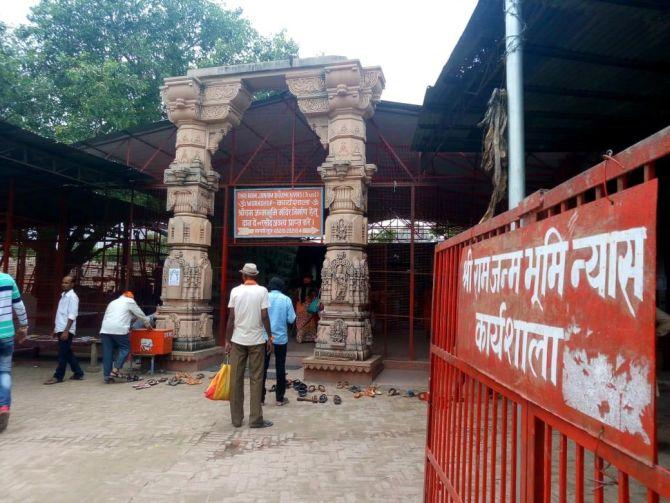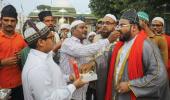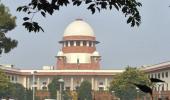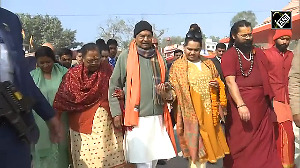
Akhil Bharat Hindu Mahasabha, a litigant in the Ram Janmabhoomi-Babri Masjid title dispute case, moved the Supreme Court on Monday against the direction to allot a five-acre plot to the Sunni Waqf Board for building a mosque in Ayodhya.
Seeking a 'limited review' of the apex court's November 9 verdict which cleared the way for construction of a Ram Temple at the disputed site in Ayodhya, ABHM became the first Hindu body to seek the review. It has also sought deletion of findings declaring the disputed structure as a Mosque.
Separately, 40 persons, including rights activists, have jointly moved the top court seeking review of its verdict in the Ayodhya case claiming that the judgment 'errs in both fact and law'.
A three-judge bench of the apex court, headed by then Chief Justice Dipak Misra, had on March 14 last year made it clear that only the parties to the original lawsuits would be allowed to put forth their arguments in the case and had disallowed some of the activists from intervening in the matter.
A five-judge bench, headed by the then Chief Justice Ranjan Gogoi, had in a unanimous verdict on November 9 decreed the entire 2.77 acre disputed land in favour of deity 'Ram Lalla' and also directed the Centre to allot a five-acre plot to Sunni Waqf Board for building a mosque in Ayodhya.
ABHM has said in its review plea that findings recorded by the top court 'terming the disputed structure as mosque is apparently not correct and against the evidence and material on record'.
"The Muslims have failed to prove that the construction in question was mosque, while on the other hand Hindus have proved that the place in question is being worshipped as birth place of Lord Ram and therefore, there is no material on record to declare the disputed structure as mosque," said the review plea, filed through advocate Vishnu Shankar Jain.
While seeking a limited review of the verdict, it said: 'Muslims have no right or title over the dispute structure and as such the five acres land cannot be allotted to them' and 'there was no pleading or any submission by any party for allotting such land to Muslims'.
"Since it is clear that the construction i.e. alleged mosque was constructed at the place of worship of Hindus taking advantage of the situation the members of Muslim community cannot assert right to religion at the said place and they cannot be awarded for the wrong committed by them at any point of time in the past," the plea said.
The plea said that the court had not 'called upon Hindus' to clarify their position for the actions taken in the year 1949 and 1992 and the observations made against them 'may be expunged'.
"The court has not taken into consideration all these facts before condemning the action of devotees and has ordered to allot five acres land to Muslims for which they are not entitled to," it said.
"It is historical fact that Hindus have suffered for the last more than 800 years and they had to face the dark days of slavery, firstly the atrocities committed by Muslim Rulers and thereafter by British Rulers. Now country is being governed by written Constitution," it said.
"Equality and rule of law must prevail and the rights of Hindus curtailed in the past must be remedied so that they may take breath in the new constitutional era," it said.
In a separate plea seeking review of the judgement, the 40 persons, including historian Irfan Habib, economist and political commentator Prabhat Patnaik, activists Harsh Mander, Nandini Sundar and John Dayal, have said they are 'deeply aggrieved' by the verdict passed by the apex court.
'The petitioners in this review petition, belong to various Indian faith traditions (including Hindu, Muslim, Sikh, Christian, Buddhist, Jain, apart from people with atheist and agnostic convictions), and are bound by their shared profound commitment to the morality of the Indian Constitution,' it said.
'The apex court's verdict has violated the same secular principles of the Constitution that it sought to uphold, by choosing to give exclusive ownership of the disputed land to the Hindu parties, for building of the Ram Temple, while rewarding the Muslim parties with a poor compensation of a plot of land measuring five acres elsewhere,' the plea, filed through advocate Prashant Bhushan, said.
It has sought a full bench for hearing the review plea saying it is not merely a title dispute but a 'contestation about the core of India's constitutional morality, and the principles of equal citizenship, secularism, justice, rule of law and fraternity'.
On December 6, six petitions were filed in the apex court seeking review of its November 9 judgment.
While five pleas were filed by Maulana Mufti Hasbullah, Moulana Mahfoozur Rehman, Mishbahuddin, Mohd Umar and Haji Nahboob, who are all supported by the All India Muslim Personal Law Board (AIMPLB), the sixth one has been filed by Mohammad Ayub.
On December 2, the first plea seeking review of Ayodhya verdict was filed in the apex court by Maulana Syed Ashhad Rashidi, legal heir of original litigant M Siddiq and also the Uttar Pradesh president of the Jamiat Ulama-e-Hind.











 © 2025
© 2025